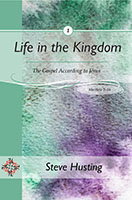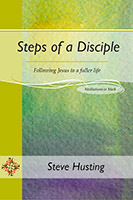“Though I speak with the tongues of men and of angels, but have not love, I have become sounding brass or a clanging cymbal”
1 Cor. 13:1
If I don’t love the person when I speak to them, such as when using a gift of tongues, prophecy, or teaching, it doesn’t profit me or my hearers. Though I learn various languages, if I don’t really care about the person who’s listening, then it’s all noise and thunder that can’t steer people to Jesus.
Love uses words, but sometimes its actions speaks louder than words. Being patient and kind, seeking the good of another, not embarrassing people, being merciful (1 Cor. 13:4)–these actions are profitable because God is love. God moves through us when we love others. These actions and attitudes point people to the reality of God in your own life. It shows how the Spirit has changed you to be like the person who loves you.
Your words of love will make an impact. In your listeners’ failings, you see your own, and speak as an equal. You know how to lift them up, because you know the Word that lifted you up, and you can pass it on in a way they can understand (2 Cor. 1:3-4). With love.
“And though I have the gift of prophecy, and understand all mysteries and all knowledge, and though I have all faith, so that I could remove mountains, but have not love, I am nothing”
1 Cor. 13:2
If I don’t have biblical love for God, I won’t have love for my neighbor. Love for God is birthed and guided by the Holy Spirit. Love is fruit, or inworking, of the Spirit, not of your flesh (Gal. 5:22-25). The Spirit changes us because He shows the problems within that keep us from loving God, we repent of them, and choose a more excellent way (Rom. 8:13-14).
The Spirit points out problems in us that prevent us from loving our neighbor. Bad habits, wrong thinking patterns, inattention to the persons near us, self-destructive behavior (Col. 3:5-9)–through our study of the Word, and other Spirit-directed avenues of insight, we acknowledge these traits because we want to love more and better and truly.
We want to learn Word’s prophecies, mysteries, and gain much knowledge, but no longer for their own sake or our own pride. Now they are the Spirit’s tools to build us up that we may in turn edify others (Col. 3:10-14). We learn because we want to know God, be more like Christ, and be effective conduits of His love.
“And though I bestow all my goods to feed the poor, and though I give my body to be burned, but have not love, it profits me nothing”
1 Cor. 13:3
Love knows what self-sacrifice really is. It’s not about giving away one’s possessions to the poor, for we can do that without loving God. We can give away much so that we may earn God’s favor, make ourselves feel better, think we’re better people for doing it, show off to others, and other self-directed reasons. None of these are the way of God’s love.
We show biblical love by knowing what God wants and responding to it (John 14:21, 23). Jesus wants us to show our love by obeying Him. When we respond to the Word in faith as though to our Lord, we use our bodies and possessions as a biblical expression of love. Read the Word. Receive, believe, and respond. This is the obedience of love the Spirit forms, for it shows that Christ is Lord over you.
If you respond to your own thinking of what is right and wrong (apart from the Word), then you are being lord, and your works are not acceptable. Your works are expressions of faith in yourself.
We are told the way of salvation is to trust in Christ from the heart, to call Him Lord, to believe that He rose from the dead (Rom. 10:8-10). When we live according to the kingdom of God, this is what we do day by day. We believe in Christ, not ourselves. We learn to find in Him as all-sufficient for us to live a life that pleases God.
We call Him Lord because He is the King in the kingdom. We want His guidance, because life otherwise steers us wrong and we lose the way. Jesus is the way (and the truth and the life), the only way back to the Father in heaven (John 14:6). When we are attentive and responsive to His commands, “Lord” becomes more than a title, and we are living out this surrendered life under His rule.
We believe He rose from the dead and He is alive (1 Cor. 15:3-5). We don’t practice a Christianity as a memorial to a dead man or for an institution. We learn to die to our old life (Rom. 6:7-14) that the risen life of Christ may live through these bodies of clay in the present (1 Cor. 4:5-7). He rose from the dead, then He will raise us up in the last day, that we may be where He is, forever (John 14:2-3).
What we see around us will all pass away. But what we know of the eternal will remain forever (2 Cor. 4:17-18). So our physical possessions are not our treasure; Christ is. We give away our possessions, along with the gospel, that they may see our good works and glorify Christ (Matt. 5:16).
The greatest commandment is to love God with all the heart, soul, mind, and strength (Matt. 22:36-37). If this is not our pursuit, then we have lost the way. We have been deceived by the world, the flesh, and the devil.
You who are born again by the Spirit know how to respond. The verses given will be subjects of prayer to the Lord, that He may keep you in the way of life–to redirect your hearts away from self to love the Lord most of all.






